Unit 1 Friends 语法学案:形容词副词比较等级(有答案)
文档属性
| 名称 | Unit 1 Friends 语法学案:形容词副词比较等级(有答案) | 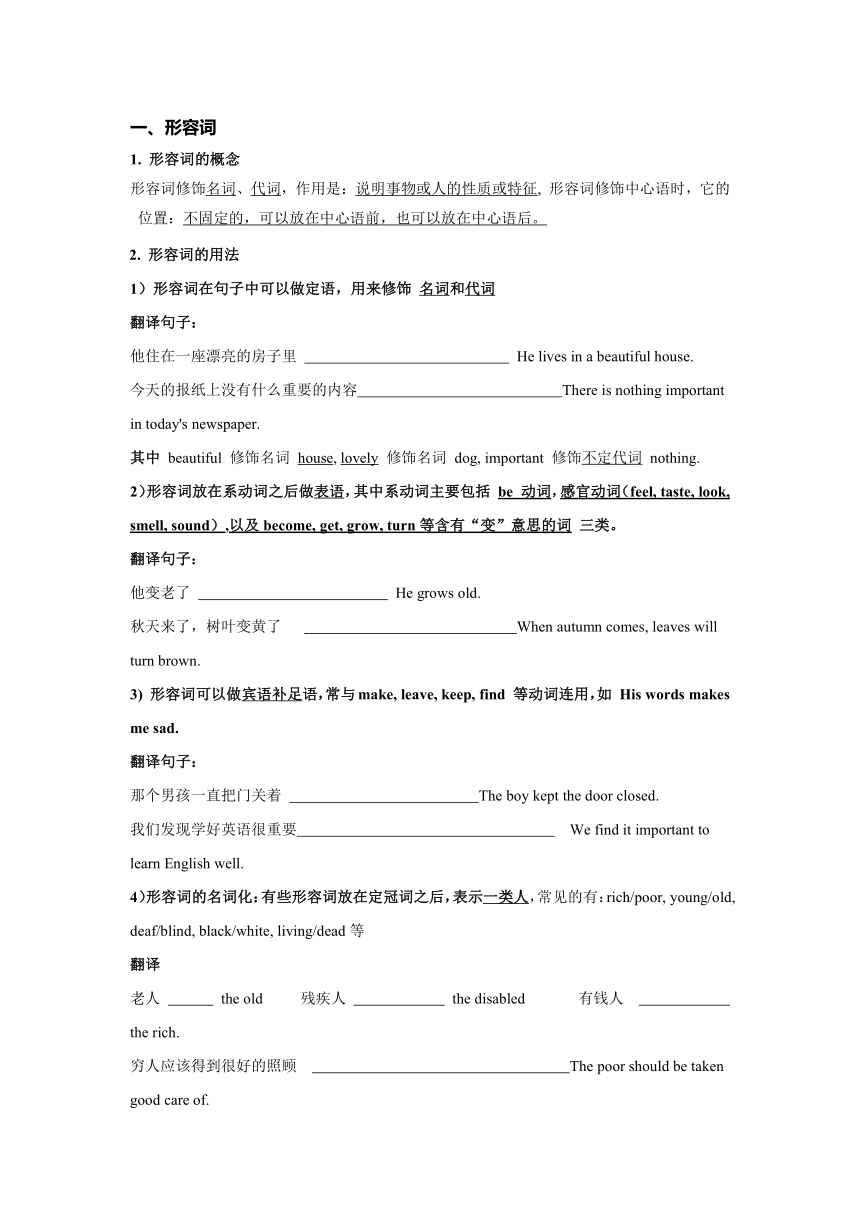 | |
| 格式 | zip | ||
| 文件大小 | 135.2KB | ||
| 资源类型 | 教案 | ||
| 版本资源 | 牛津译林版 | ||
| 科目 | 英语 | ||
| 更新时间 | 2017-08-22 12:15:54 | ||
图片预览

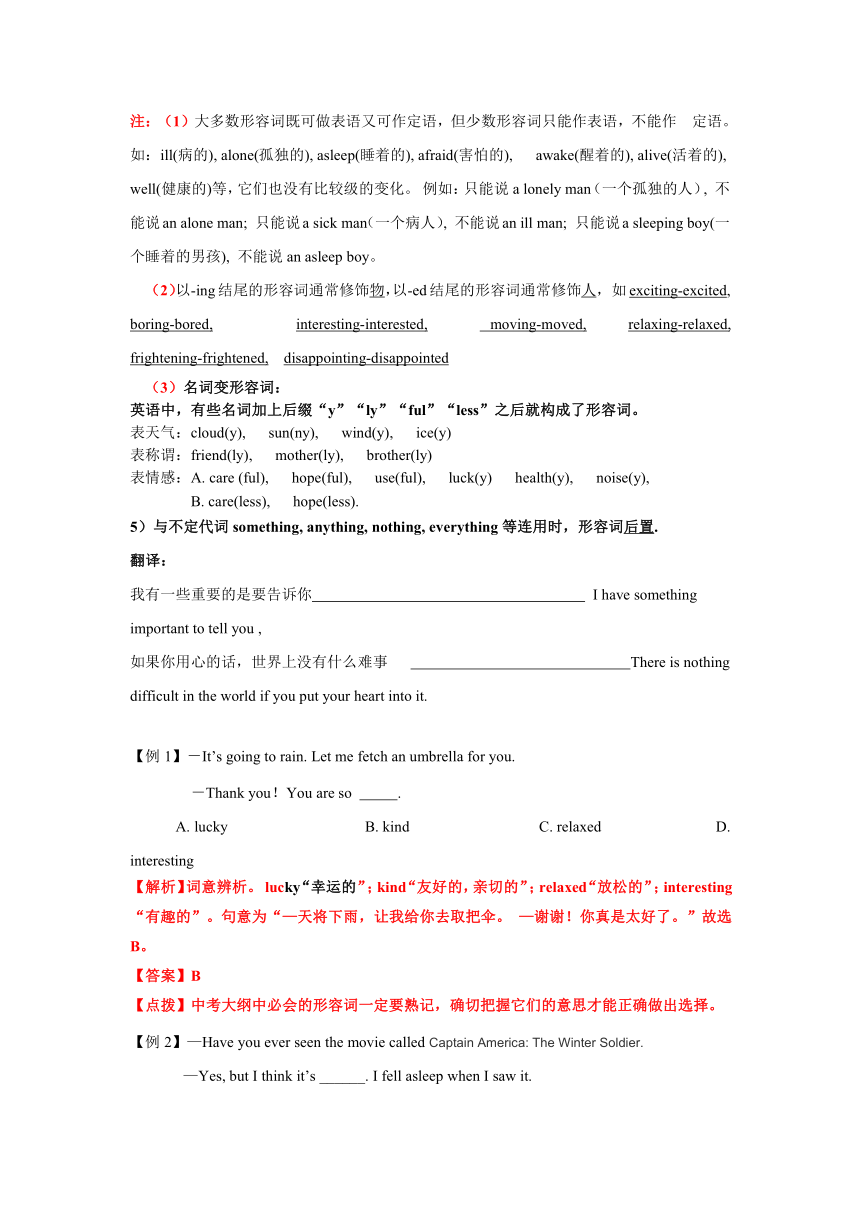
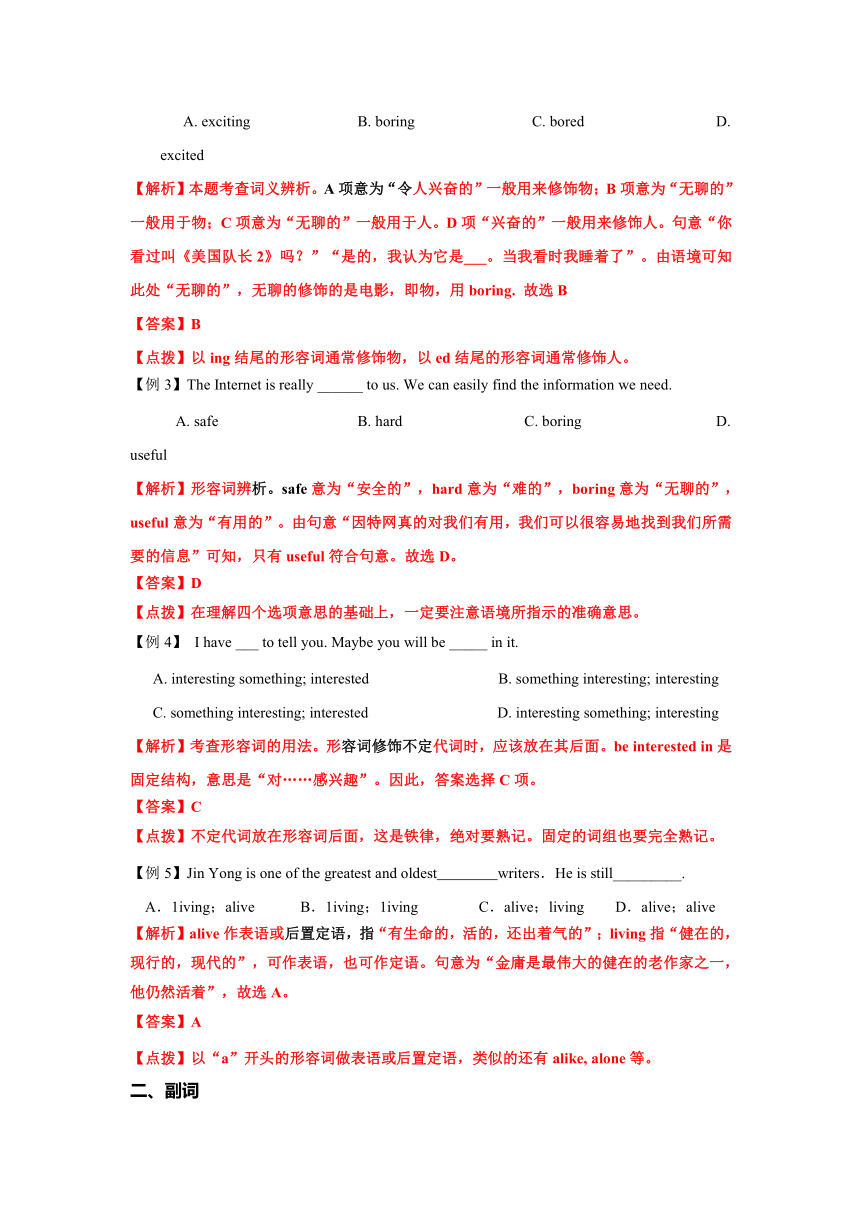
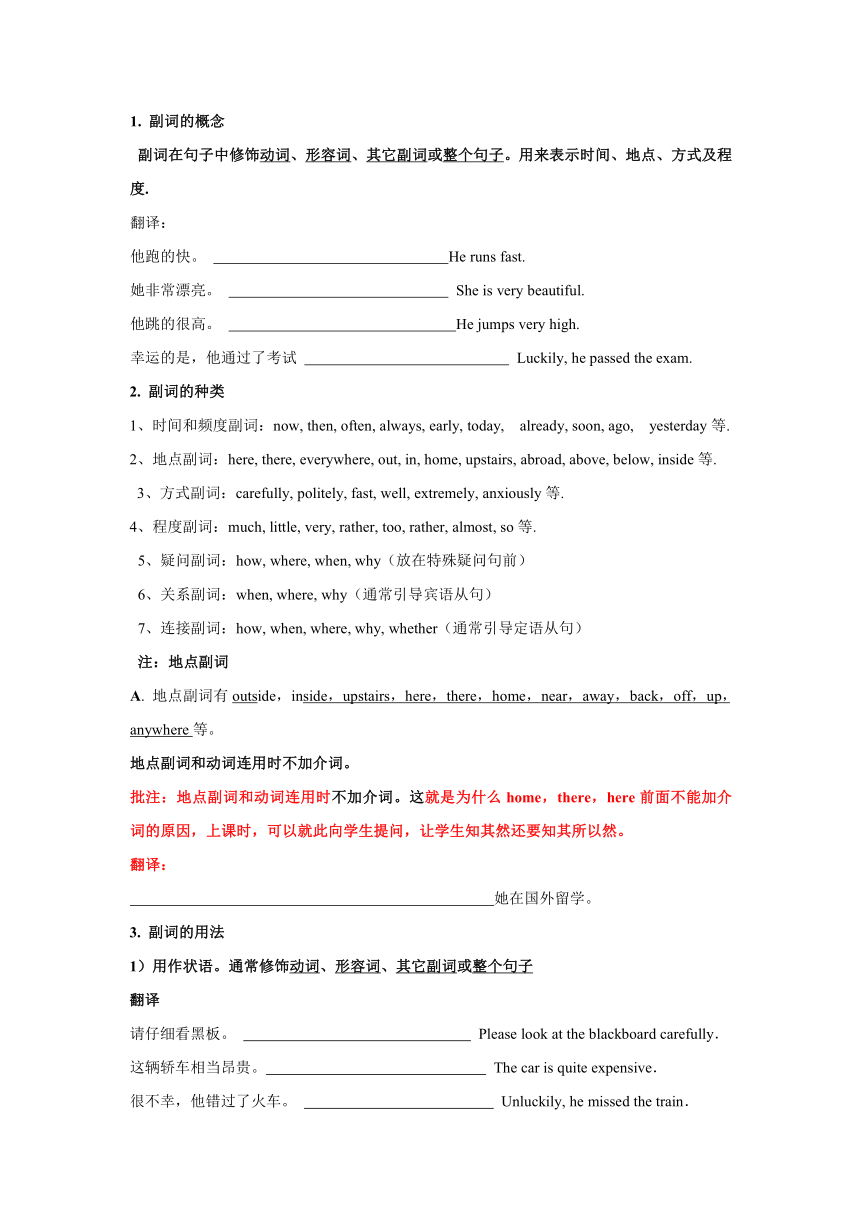
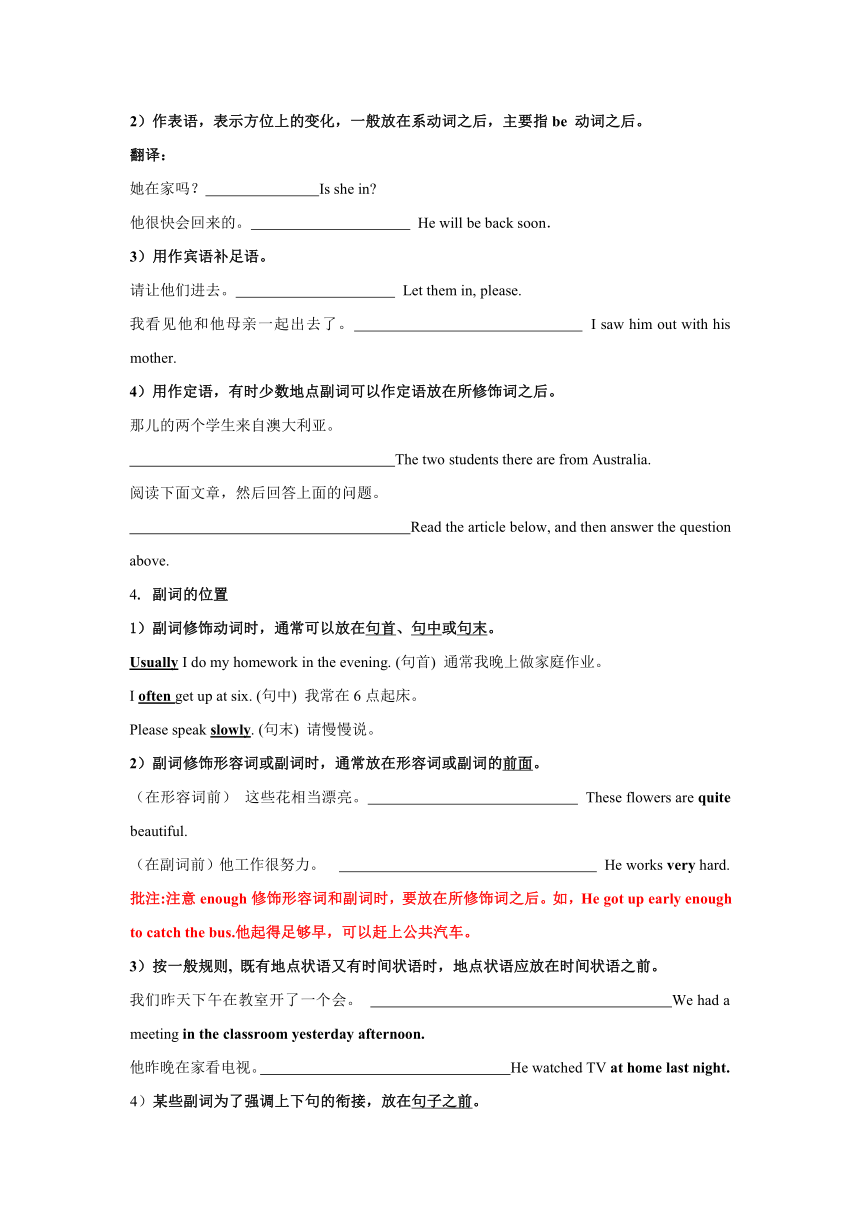
文档简介
一、形容词
1.
形容词的概念
形容词修饰名词、代词,作用是:说明事物或人的性质或特征,
形容词修饰中心语时,它的位置:不固定的,可以放在中心语前,也可以放在中心语后。
2.
形容词的用法
1)形容词在句子中可以做定语,用来修饰
名词和代词
翻译句子:
他住在一座漂亮的房子里
He
lives
in
a
beautiful
house.
今天的报纸上没有什么重要的内容
There
is
nothing
important
in
today's
newspaper.
其中
beautiful
修饰名词
house,
lovely
修饰名词
dog,
important
修饰不定代词
nothing.
2)形容词放在系动词之后做表语,其中系动词主要包括
be
动词,感官动词(feel,
taste,
look,
smell,
sound),以及become,
get,
grow,
turn等含有“变”意思的词
三类。
翻译句子:
他变老了
He
grows
old.
秋天来了,树叶变黄了
When
autumn
comes,
leaves
will
turn
brown.
3)
形容词可以做宾语补足语,常与make,
leave,
keep,
find
等动词连用,如
His
words
makes
me
sad.
翻译句子:
那个男孩一直把门关着
The
boy
kept
the
door
closed.
我们发现学好英语很重要
We
find
it
important
to
learn
English
well.
4)形容词的名词化:有些形容词放在定冠词之后,表示一类人,常见的有:rich/poor,
young/old,
deaf/blind,
black/white,
living/dead等
翻译
老人
the
old
残疾人
the
disabled
有钱人
the
rich.
穷人应该得到很好的照顾
The
poor
should
be
taken
good
care
of.
注:(1)大多数形容词既可做表语又可作定语,但少数形容词只能作表语,不能作
定语。如:ill(病的),
alone(孤独的),
asleep(睡着的),
afraid(害怕的),
awake(醒着的),
alive(活着的),
well(健康的)等,它们也没有比较级的变化。
例如:只能说a
lonely
man(一个孤独的人),
不能说an
alone
man;
只能说a
sick
man(一个病人),
不能说an
ill
man;
只能说a
sleeping
boy(一个睡着的男孩),
不能说an
asleep
boy。
(2)以-ing结尾的形容词通常修饰物,以-ed结尾的形容词通常修饰人,
如exciting-excited,
boring-bored,
interesting-interested,
moving-moved,
relaxing-relaxed,
frightening-frightened,
disappointing-disappointed
(3)名词变形容词:
英语中,有些名词加上后缀“y”“ly”“ful”“less”之后就构成了形容词。
表天气:cloud(y),
sun(ny),
wind(y),
ice(y)
表称谓:friend(ly),
mother(ly),
brother(ly)
表情感:A.
care
(ful),
hope(ful),
use(ful),
luck(y)
health(y),
noise(y),
B.
care(less),
hope(less).
5)与不定代词something,
anything,
nothing,
everything等连用时,形容词后置.
翻译:
我有一些重要的是要告诉你
I
have
something
important
to
tell
you
,
如果你用心的话,世界上没有什么难事
There
is
nothing
difficult
in
the
world
if
you
put
your
heart
into
it.
【例1】-It’s
going
to
rain.
Let
me
fetch
an
umbrella
for
you.
-Thank
you!You
are
so
.
A.
lucky
B.
kind
C.
relaxed
D.
interesting
【解析】词意辨析。
lucky“幸运的”;kind“友好的,亲切的”;relaxed“放松的”;interesting“有趣的”。句意为“—天将下雨,让我给你去取把伞。
—谢谢!你真是太好了。”故选B。
【答案】B
【点拨】中考大纲中必会的形容词一定要熟记,确切把握它们的意思才能正确做出选择。
【例2】—Have
you
ever
seen
the
movie
called
Captain
America:
The
Winter
Soldier.
—Yes,
but
I
think
it’s
______.
I
fell
asleep
when
I
saw
it.
A.
exciting
B.
boring
C.
bored
D.
excited
【解析】本题考查词义辨析。A项意为“令人兴奋的”一般用来修饰物;B项意为“无聊的”一般用于物;C项意为“无聊的”一般用于人。D项“兴奋的”一般用来修饰人。句意“你看过叫《美国队长2》吗?”“是的,我认为它是___。当我看时我睡着了”。由语境可知此处“无聊的”,无聊的修饰的是电影,即物,用boring.
故选B
【答案】B
【点拨】以ing结尾的形容词通常修饰物,以ed结尾的形容词通常修饰人。
【例3】The
Internet
is
really
______
to
us.
We
can
easily
find
the
information
we
need.
A.
safe
B.
hard
C.
boring
D.
useful
【解析】形容词辨析。safe意为“安全的”,hard意为“难的”,boring意为“无聊的”,useful意为“有用的”。由句意“因特网真的对我们有用,我们可以很容易地找到我们所需要的信息”可知,只有useful符合句意。故选D。
【答案】D
【点拨】在理解四个选项意思的基础上,一定要注意语境所指示的准确意思。
【例4】
I
have
___
to
tell
you.
Maybe
you
will
be
_____
in
it.
A.
interesting
something;
interested
B.
something
interesting;
interesting
C.
something
interesting;
interested
D.
interesting
something;
interesting
【解析】考查形容词的用法。形容词修饰不定代词时,应该放在其后面。be
interested
in是固定结构,意思是“对……感兴趣”。因此,答案选择C项。
【答案】C
【点拨】不定代词放在形容词后面,这是铁律,绝对要熟记。固定的词组也要完全熟记。
【例5】Jin
Yong
is
one
of
the
greatest
and
oldest
writers.He
is
still_________.
A.1iving;alive
B.1iving;1iving
C.alive;living
D.alive;alive
【解析】alive作表语或后置定语,指“有生命的,活的,还出着气的”;living指“健在的,现行的,现代的”,可作表语,也可作定语。句意为“金庸是最伟大的健在的老作家之一,他仍然活着”,故选A。
【答案】A
【点拨】以“a”开头的形容词做表语或后置定语,类似的还有alike,
alone等。
二、副词
1.
副词的概念
副词在句子中修饰动词、形容词、其它副词或整个句子。用来表示时间、地点、方式及程度.
翻译:
他跑的快。
He
runs
fast.
她非常漂亮。
She
is
very
beautiful.
他跳的很高。
He
jumps
very
high.
幸运的是,他通过了考试
Luckily,
he
passed
the
exam.
2.
副词的种类
1、时间和频度副词:now,
then,
often,
always,
early,
today,
already,
soon,
ago,
yesterday等.
2、地点副词:here,
there,
everywhere,
out,
in,
home,
upstairs,
abroad,
above,
below,
inside等.
3、方式副词:carefully,
politely,
fast,
well,
extremely,
anxiously等.
4、程度副词:much,
little,
very,
rather,
too,
rather,
almost,
so等.
5、疑问副词:how,
where,
when,
why(放在特殊疑问句前)
6、关系副词:when,
where,
why(通常引导宾语从句)
7、连接副词:how,
when,
where,
why,
whether(通常引导定语从句)
注:地点副词
A.
地点副词有outside,inside,upstairs,here,there,home,near,away,back,off,up,anywhere等。
地点副词和动词连用时不加介词。
批注:地点副词和动词连用时不加介词。这就是为什么home,there,here前面不能加介词的原因,上课时,可以就此向学生提问,让学生知其然还要知其所以然。
翻译:
她在国外留学。
3.
副词的用法
1)用作状语。通常修饰动词、形容词、其它副词或整个句子
翻译
请仔细看黑板。
Please
look
at
the
blackboard
carefully.
这辆轿车相当昂贵。
The
car
is
quite
expensive.
很不幸,他错过了火车。
Unluckily,
he
missed
the
train.
2)作表语,表示方位上的变化,一般放在系动词之后,主要指be
动词之后。
翻译:
她在家吗?
Is she in
他很快会回来的。
He
will
be
back
soon.
3)用作宾语补足语。
请让他们进去。
Let
them
in,
please.
我看见他和他母亲一起出去了。
I
saw
him
out
with
his
mother.
4)用作定语,有时少数地点副词可以作定语放在所修饰词之后。
那儿的两个学生来自澳大利亚。
The two students there are from Australia.
阅读下面文章,然后回答上面的问题。
Read
the
article
below,
and
then
answer
the
question
above.
4.
副词的位置
1)副词修饰动词时,通常可以放在句首、句中或句末。
Usually
I
do
my
homework
in
the
evening.
(句首)
通常我晚上做家庭作业。
I
often
get
up
at
six.
(句中)
我常在6点起床。
Please
speak
slowly.
(句末)
请慢慢说。
2)副词修饰形容词或副词时,通常放在形容词或副词的前面。
(在形容词前)
这些花相当漂亮。
These
flowers
are
quite
beautiful.
(在副词前)他工作很努力。
He
works
very
hard.
批注:注意enough修饰形容词和副词时,要放在所修饰词之后。如,He
got
up
early
enough
to
catch
the
bus.他起得足够早,可以赶上公共汽车。
3)按一般规则,
既有地点状语又有时间状语时,地点状语应放在时间状语之前。
我们昨天下午在教室开了一个会。
We
had
a
meeting
in
the
classroom
yesterday
afternoon.
他昨晚在家看电视。
He
watched
TV
at
home
last
night.
4)某些副词为了强调上下句的衔接,放在句子之前。
忽然她冲出了房子
Suddenly
she
ran
out
of
the
house.
注:
①形容词一般修饰名词,副词一般修饰动词、形容词或副词。
②一些形容词后加上-ly可以变成副词,如slow-slowly,
quick-quickly,
careful-carefully等。
【例1】—
It's
so
cold
today.
—
Yes,
it's
colder
than
it
was
yesterday.
A. some
B. more
C. very
D. much
【解析】考查副词修饰比较级的用法。比较级前可用much、even、a
little修饰。故选D。
【答案】D
【点拨】副词修饰动词、形容词和比较级。much可以修饰动词、副词、以及比较级。
【例2】In
China
it
is
a
custom
to
give
kids
lucky
money_________
during
the
Spring
Festival.
A.
finally
B.
luckily
C.
simply
D.
especially
【解析】副词的用法。finally
是最后的,luckily指幸运的,simply意思是仅仅,especially指的是尤其,特别是。根据句意可知“在中国,尤其是春节期间给孩子红包成为一个传统了。”
【答案】D
【点拨】准确把握每一个副词的含义是解题的关键,因此要熟记常考副词的意义。
【例3】–
Do
you
often
go
to
the
gym
–
No,
________.
I
don’t
like
sports
at
all.
A.
always
B.
never
C.
sometimes
D.
usually
【解析】考查副词的辨析。
always“总是,一直”;
never“从不”;
sometimes“有时”;
usually“通常”。由答语“I
don’t
like
sports
at
all.”,可知“我一点都不喜欢体育”,所以答语应为“我从不去体育馆”,故选B。
【答案】B
【点拨】频度副词的含义以及频率的排序是要熟记的内容。而且要知道seldom放在句子中表示否定的意思。
【例4】—Do
you
know
________
she
went
to
the
movie
last
night
—On
foot.
A.
when
B.
why
C.
how
D.
where
【解析】疑问副词的用法。从答句On
foot可以看出问句是有关交通方式的,when表示“什么时间”;why表示“为什么”,how表示“怎么”,对交通方式提问一般用how,因此本题选C。
【答案】C
【点拨】疑问副词的意义要熟记,另外,疑问副词+动词不定式以及引导宾语从句的用法也要牢记。这样在考查疑问副词的时候才不会出错。
三、形副的原级、比较级和最高级
1.形容词和副词的原级用法
1)as
+
原级
+
as,表示两者在某方面程度一样
,它的否定形式not
as
+
原级
+
as,或者not
so
+
原级
+
as,表示两者在某方面程度不一样
翻译:
我的包和小余一样大
My
bag
is
as
big
as
Xiaoyu’s.
这个大楼看起来没有那个大楼高
This
building
looks
not
so
(as)
high
as
that
one.
汤姆跑和杰克跑的一样快
Tom
runs
as
fast
as
Jack.
注:(1)在as…..as…结构中,一定是两个同范畴的事物进行比较
(2)
在两个as
中间具体加什么词有句中动词决定
,一般和be搭配的是形容词,和动词搭配的是动词
2)the
same
+名词+as表示同等比较
如:A
is
the
same
size
as
B.
A
的尺码与B一样===A
and
B
are
of
the
same
size.
A
is
the
same
color
as
B
A
的颜色和B一样==A
and
B
are
the
same
color.
3)在as
…
as
的结构中,第一个as的前面可以加上表示倍数的词:
twice
,
(
three
)
times
等。
亚洲是欧洲的四倍(亚洲比欧洲大三倍)
Asia
is
four
times
as
large
as
Europe.
M
等于N的两倍(M比N大一倍)
M
is
twice
as
large
as
N.
2.形容词和副词的比较级
1)形容词、副词的比较级用于两个人或事物的比较。表示在两者中间一方比另一方“更加…”。
基本结构是:
A+比较级+than+B
根据句中的动词决定使用形容词的比较级还是副词的比较级
连词than后可接句子,也可接名词、代词、名词短语、介词短语、动词、动词不定式、ing结构和ed结构。
我们老师的个子比我们的高。
Our
teacher
is
taller
than
us.
骑自行车去那儿比坐汽车更有趣。
It
is
more
interesting
to
go
there
by
bike
than
by
car.
今天的天气比昨天暖和。
It
is
warmer
today
than
it
was
yesterday.
这家店里的衣服比那家店(里的衣服)贵。
The
clothes
in
this
shop
are
more
expensive
than
those
in
that
shop.
朱迪的头发比莉莉(的)长。
Judy’s
hair
is
longer
than
Lily’s.
注:than前后两项相比较的人或事物要一致。
2)形容词前如加
less
和
least
则表示"较不"和"最不"
。
重要
important
较不重要
less
important
最不重要least
important
这个房子没有那个房子漂亮
This
room
is
less
beautiful
than
that
one.
3)一方随另一方的程度而变化时用:the+比较级…the+比较级…。表示“越...
就越...”。
你学的越多,
就知道的越多
The
more
you
study,
the
more
you
know.
越多越好
The
more,
the
better.
工作越努力,感觉越充实
The
harder
he
works,
the
happier
he
feels.
4)本身程度发生改变时用"
形容词/副词比较级
+
and
+
同一个形容词/副词比较级
"。表示
"
越来越...
"。
天气越来越热了
It's
getting
hotter
and
hotter.
那姑娘长得越来越漂亮了
The
girl
becomes
more
and
more
beautiful.
他越跑越快
He
runs
faster
and
faster.
5)比较级前可用a
little,
a
bit,
a
lot,
far,
much,
even等词语表示超过另一方的程度。
这本书比那本书贵很多
This
book
is
far
more
expensive
than
that
one.
他现在好多了
He's
a
lot
better
now
她比他年轻很多
She's
much
younger
than
him.
6)表示一方比另一方更…多少时,可以在比较级前加名词。
我哥哥比我大两岁
My
brother
is
two
years
older
than
me.
7)当两者比较,只出现一方,且句中含有of
the
two时,比较级前要加the,表示特指两者当中较。。。的一个
他是两个男孩中较高的一个
He
is
the
taller
of
the
two
boys.
注:比较级、最高级的规则变化
注:比较级、最高级的不规则变化
原级
比较级
最高级
good
better
best
well
better
best
many
more
most
much
more
most
bad
worse
worst
ill
worse
worst
badly
worse
worst
old
older/elder
oldest/eldest
little
less
least
far
farther/further
farthest/furthest
3.形容词和副词的最高级
1)三者或三者以上相比,
表示最高程度时,
用
“the+最高级+表示范围的短语或从句”
的结构表示。其中表示范围的介词使用规律为:of或among接个体数量;in接范围。
张华是三人当中最高的
Zhang
Hua
is
the
tallest
of
(among)the
three.
他在他们班学习最努力
He
works
(the)
hardest
in
his
class.
他在三人当中做的最差
He
did
the
worst
of
the
three.
2)用于特殊句型中,如:one
of
+最高级+名词复数
+范围
上海是中国最大城市之一
Shanghai
is
one
of
the
biggest
cities
in
China.
扎龙是世界上最重要的湿地之一
ZhaLong
is
one
of
the
most
important
wetlands
in
the
world
3)用比较级的形式表达最高级的意思。
在这种情况下,往往是将一个人或是一件事与其他所有的人、物或其他中任意一个人、物进行比较。自己不可以与自己相比较,所以常在状语中用any
,other
,
else类的字眼。
他比他班的任何一个学生都高
He
is
taller
than
any
other
student
in
his
class.(any
other
student里面已排除了he)
上海比澳大利亚任何城市都大。
Shanghai
is
larger
than
any
city
in
Australia.
上海比中国任何一座城市都大。
Shanghai
is
larger
than
any
other
city
in
China.
例题
1、—It
seems
that
Alice
never
wants
to
do
anything
except
draw
pictures.
—Right.
That's
what
she
likes
to
do
________.
A.more
B.less
C.most
D.Least
【解析】上句“爱丽丝好像是除了画画什么也不想做”,下句重申“的确,那是她‘最’喜欢做的。”用most最高级来修饰动词,故选C。
2、—Would
you
like
some
coffee
—No,
thanks.
I
________
drink
coffee.
Coffee
is
bad
for
my
stomach.
A.almost
B.already
C.hardly
D.still
【解析】almost“几乎,差不多”;already“已经”;hardly“几乎不”;still“仍然”,根据句意,故答案选C。
3、Dear
students,
please
read
every
sentence
carefully.
________
you
are,
________
mistakes
you'll
make.
A.The
more
carefully;
the
fewer
B.The
more
careful;
the
less
C.The
more
carefully;
the
less
D.The
more
careful;
the
fewer
【解析】本题考查形容词比较级的用法。“the+比较级…the+比较级”的用法,表示“越……越……”。“你越细心”这个句子是系表结构,故用形容词careful。fewer是few
的比较级,修饰可数名词,故选D。
4、She
is
very
good
at
painting.
She
can
paint
________
her
teacher.
A.as
better
as
B.as
well
as
C.as
good
as
D.so
well
as
【解析】as...as
中间用形容词,副词原级,答案A可以排除;再则副词修饰动词,故答案选B。
5、—Can
I
help
you
—Well,
I'm
afraid
the
box
is
________
heavy
for
you,
but
thank
you
all
the
same.
A.so
B.much
C.very
D.too
【解析】这里副词修饰形容词,so,very不符合题意,much
修饰形容词比较级。故答案选D。
6、—Health
is
money.
—But
I
think
it
is
________
money.
A.as
important
as
B.more
important
than
C.so
important
than
D.the
same
as
【解析】形容词的用法。句子意思是“健康就是财富。”“但我认为健康比金钱更重要。”这里是两者比较就要用比较级,important的比较级是前面加more,且要和than连用,所以选择答案B。
7、Sometimes
walking
is
even
________
than
driving
during
the
busy
traffic
time.
A.fast
B.faster
C.slow
D.slower
【解析】形容词比较级的用法。由句中than可判断应用形容词的比较级,可排除A、C,又因为句意为“有时,步行要比在交通拥挤时开车要快。”
故选B。
8、—Don't
worry.
My
mother
will
look
after
your
baby
________.
—Thanks
a
lot.
A.careful
enough
B.enough
careful
C.carefully
enough
D.
carefully
enough
【解析】副词的用法。根据对话内容可知,“我妈妈会非常细心地照顾好你的孩子”,强调照顾的程度;当副词enough
修饰其他副词或形容词时,一定放在被修饰词之后。故选择C。
9、Study
hard!
________
you
study,
________
results
you'll
get.
A.Harder;
better
B.The
harder;
better
C.The
harder;
the
better
D.Harder;
the
better
【解析】形容词与副词比较级用法。固定结构“the
+
比较级,the
+
比较级”表示“越……越……”。句意为“学习越认真,成绩就越好。”
10、Julia
is
very
clever.
In
fact,I
doubt
whether
anyone
in
the
class
has
________
IQ.
A.a
high
B.a
higher
C.the
higher
D.the
highest
【解析】形容词的比较级。句意为“我怀疑班上是否有比她智商更高的学生了。”用形容词比较级形式修饰名词。故选B。
11、—Where
would
you
like
to
go
on
your
summer
holiday,
Mike
—I'd
like
to
go
________.
A.nowhere
interesting
B.interesting
anywhere
C.somewhere
interesting
D.interesting
somewhere
【解析】本题考查形容词修饰不定代词的位置。形容词修饰不定代词要放在不定代词之后。本题是肯定的陈述句。故选C。
12、—Why
don't
you
like
winter
in
Beijing
—Because
it
is
________
winter
in
Guangzhou.
A.as
cold
as
B.much
colder
than
C.not
so
cold
as
D.not
colder
than
【解析】形容词比较级。本题尽管是比较级的考查,但是更加突出语境的考查,而不是纯语法的考查。从形式上四个答案均正确。根据句意可知他并不喜欢北京的冬天,因为北京比广州冷。as
cold
as意为“与广州一样冷”;not
so
cold
as意为“不及广州冷”;not
colder
than意为“不比广州冷”,均不合题意,因此答案为B。
13、—How
can
I
get
along
well
with
others,
father
—Try
to
smile
to
others,
boy.
That
will
make
________
much
________.
them;
easier
B.them;
more
easy
C.it;
easy
D.it;
easier
【解析】much可用于修饰形容词的比较级,easy的比较级是easier,首先排除B和C;代指上文所说的事,应该用it,因此答案为D。
14、—What
is
your
favorite
sport
—Swimming,
I
think.
It’s
________
of
all.
A.easier
B.more
difficult
C.the
most
interesting
D.the
most
boring
【解析】考查形容词的最高级。询问最喜欢的运动,其回答的形容词应该是最有趣的。
15、—Why
do
you
always
watch
Channel
10
instead
of
Channel
5,
Grandpa
—The
programs
on
Channel
10
are
________
better.
A.more
much
B.much
more
C.more
D.much
【解析】形容词比较级的用法。more单独使用不能修饰比较级,答案为D。
16、The
modern
Olympics
started
in
Athens,
Greece.
Its
motto
is
“________.”
A.Fast;
high;
strong
B.Faster;
higher;
stronger
C.Fastest;
highest;
strongest
【解析】形容词的比较级和最高级。根据句意可判断。
17、—I'm
not
sure
what
to
get
mom
for
her
birthday.
—Oh,
I've
no
idea,
________.
A.too
B.neither
C.either
D.also
【解析】too用于肯定句的句末;neither“两者都不”的意思;either用于否定句的句末;also用于肯定句的句中。
18、They
clapped
and
shouted
________
when
they
saw
Yao
Ming
appear
on
the
playground.
A.hardly
B.quietly
C.excitedly
D.Angrily
【解析】本题考查的是副词词义的辨析。hardly“几乎不”;quietly“安静地”;excitedly“兴奋地”;angrily“生气地”。根据句意,很容易得出答案C。
19、—________
do
you
study
for
a
test
—I
study
by
working
with
a
group.
A.Where
B.How
C.When
D.Why
【解析】提问方式,故选择B。
20、—What
do
you
think
of
the
lecture
of
Li
Yang's
Crazy
English
—I
think
it's
________,
but
someone
thinks
it's
much
too
________.
A.wonderful
enough;
bored
B.enough
wonderful;
boring
C.wonderful
enough;
boring
D.enough
wonderful;
bored
【解析】enough修饰形容词或副词时放在形容词或副词的后面;疯狂英语本身无聊,所以用boring。
1.
形容词的概念
形容词修饰名词、代词,作用是:说明事物或人的性质或特征,
形容词修饰中心语时,它的位置:不固定的,可以放在中心语前,也可以放在中心语后。
2.
形容词的用法
1)形容词在句子中可以做定语,用来修饰
名词和代词
翻译句子:
他住在一座漂亮的房子里
He
lives
in
a
beautiful
house.
今天的报纸上没有什么重要的内容
There
is
nothing
important
in
today's
newspaper.
其中
beautiful
修饰名词
house,
lovely
修饰名词
dog,
important
修饰不定代词
nothing.
2)形容词放在系动词之后做表语,其中系动词主要包括
be
动词,感官动词(feel,
taste,
look,
smell,
sound),以及become,
get,
grow,
turn等含有“变”意思的词
三类。
翻译句子:
他变老了
He
grows
old.
秋天来了,树叶变黄了
When
autumn
comes,
leaves
will
turn
brown.
3)
形容词可以做宾语补足语,常与make,
leave,
keep,
find
等动词连用,如
His
words
makes
me
sad.
翻译句子:
那个男孩一直把门关着
The
boy
kept
the
door
closed.
我们发现学好英语很重要
We
find
it
important
to
learn
English
well.
4)形容词的名词化:有些形容词放在定冠词之后,表示一类人,常见的有:rich/poor,
young/old,
deaf/blind,
black/white,
living/dead等
翻译
老人
the
old
残疾人
the
disabled
有钱人
the
rich.
穷人应该得到很好的照顾
The
poor
should
be
taken
good
care
of.
注:(1)大多数形容词既可做表语又可作定语,但少数形容词只能作表语,不能作
定语。如:ill(病的),
alone(孤独的),
asleep(睡着的),
afraid(害怕的),
awake(醒着的),
alive(活着的),
well(健康的)等,它们也没有比较级的变化。
例如:只能说a
lonely
man(一个孤独的人),
不能说an
alone
man;
只能说a
sick
man(一个病人),
不能说an
ill
man;
只能说a
sleeping
boy(一个睡着的男孩),
不能说an
asleep
boy。
(2)以-ing结尾的形容词通常修饰物,以-ed结尾的形容词通常修饰人,
如exciting-excited,
boring-bored,
interesting-interested,
moving-moved,
relaxing-relaxed,
frightening-frightened,
disappointing-disappointed
(3)名词变形容词:
英语中,有些名词加上后缀“y”“ly”“ful”“less”之后就构成了形容词。
表天气:cloud(y),
sun(ny),
wind(y),
ice(y)
表称谓:friend(ly),
mother(ly),
brother(ly)
表情感:A.
care
(ful),
hope(ful),
use(ful),
luck(y)
health(y),
noise(y),
B.
care(less),
hope(less).
5)与不定代词something,
anything,
nothing,
everything等连用时,形容词后置.
翻译:
我有一些重要的是要告诉你
I
have
something
important
to
tell
you
,
如果你用心的话,世界上没有什么难事
There
is
nothing
difficult
in
the
world
if
you
put
your
heart
into
it.
【例1】-It’s
going
to
rain.
Let
me
fetch
an
umbrella
for
you.
-Thank
you!You
are
so
.
A.
lucky
B.
kind
C.
relaxed
D.
interesting
【解析】词意辨析。
lucky“幸运的”;kind“友好的,亲切的”;relaxed“放松的”;interesting“有趣的”。句意为“—天将下雨,让我给你去取把伞。
—谢谢!你真是太好了。”故选B。
【答案】B
【点拨】中考大纲中必会的形容词一定要熟记,确切把握它们的意思才能正确做出选择。
【例2】—Have
you
ever
seen
the
movie
called
Captain
America:
The
Winter
Soldier.
—Yes,
but
I
think
it’s
______.
I
fell
asleep
when
I
saw
it.
A.
exciting
B.
boring
C.
bored
D.
excited
【解析】本题考查词义辨析。A项意为“令人兴奋的”一般用来修饰物;B项意为“无聊的”一般用于物;C项意为“无聊的”一般用于人。D项“兴奋的”一般用来修饰人。句意“你看过叫《美国队长2》吗?”“是的,我认为它是___。当我看时我睡着了”。由语境可知此处“无聊的”,无聊的修饰的是电影,即物,用boring.
故选B
【答案】B
【点拨】以ing结尾的形容词通常修饰物,以ed结尾的形容词通常修饰人。
【例3】The
Internet
is
really
______
to
us.
We
can
easily
find
the
information
we
need.
A.
safe
B.
hard
C.
boring
D.
useful
【解析】形容词辨析。safe意为“安全的”,hard意为“难的”,boring意为“无聊的”,useful意为“有用的”。由句意“因特网真的对我们有用,我们可以很容易地找到我们所需要的信息”可知,只有useful符合句意。故选D。
【答案】D
【点拨】在理解四个选项意思的基础上,一定要注意语境所指示的准确意思。
【例4】
I
have
___
to
tell
you.
Maybe
you
will
be
_____
in
it.
A.
interesting
something;
interested
B.
something
interesting;
interesting
C.
something
interesting;
interested
D.
interesting
something;
interesting
【解析】考查形容词的用法。形容词修饰不定代词时,应该放在其后面。be
interested
in是固定结构,意思是“对……感兴趣”。因此,答案选择C项。
【答案】C
【点拨】不定代词放在形容词后面,这是铁律,绝对要熟记。固定的词组也要完全熟记。
【例5】Jin
Yong
is
one
of
the
greatest
and
oldest
writers.He
is
still_________.
A.1iving;alive
B.1iving;1iving
C.alive;living
D.alive;alive
【解析】alive作表语或后置定语,指“有生命的,活的,还出着气的”;living指“健在的,现行的,现代的”,可作表语,也可作定语。句意为“金庸是最伟大的健在的老作家之一,他仍然活着”,故选A。
【答案】A
【点拨】以“a”开头的形容词做表语或后置定语,类似的还有alike,
alone等。
二、副词
1.
副词的概念
副词在句子中修饰动词、形容词、其它副词或整个句子。用来表示时间、地点、方式及程度.
翻译:
他跑的快。
He
runs
fast.
她非常漂亮。
She
is
very
beautiful.
他跳的很高。
He
jumps
very
high.
幸运的是,他通过了考试
Luckily,
he
passed
the
exam.
2.
副词的种类
1、时间和频度副词:now,
then,
often,
always,
early,
today,
already,
soon,
ago,
yesterday等.
2、地点副词:here,
there,
everywhere,
out,
in,
home,
upstairs,
abroad,
above,
below,
inside等.
3、方式副词:carefully,
politely,
fast,
well,
extremely,
anxiously等.
4、程度副词:much,
little,
very,
rather,
too,
rather,
almost,
so等.
5、疑问副词:how,
where,
when,
why(放在特殊疑问句前)
6、关系副词:when,
where,
why(通常引导宾语从句)
7、连接副词:how,
when,
where,
why,
whether(通常引导定语从句)
注:地点副词
A.
地点副词有outside,inside,upstairs,here,there,home,near,away,back,off,up,anywhere等。
地点副词和动词连用时不加介词。
批注:地点副词和动词连用时不加介词。这就是为什么home,there,here前面不能加介词的原因,上课时,可以就此向学生提问,让学生知其然还要知其所以然。
翻译:
她在国外留学。
3.
副词的用法
1)用作状语。通常修饰动词、形容词、其它副词或整个句子
翻译
请仔细看黑板。
Please
look
at
the
blackboard
carefully.
这辆轿车相当昂贵。
The
car
is
quite
expensive.
很不幸,他错过了火车。
Unluckily,
he
missed
the
train.
2)作表语,表示方位上的变化,一般放在系动词之后,主要指be
动词之后。
翻译:
她在家吗?
Is she in
他很快会回来的。
He
will
be
back
soon.
3)用作宾语补足语。
请让他们进去。
Let
them
in,
please.
我看见他和他母亲一起出去了。
I
saw
him
out
with
his
mother.
4)用作定语,有时少数地点副词可以作定语放在所修饰词之后。
那儿的两个学生来自澳大利亚。
The two students there are from Australia.
阅读下面文章,然后回答上面的问题。
Read
the
article
below,
and
then
answer
the
question
above.
4.
副词的位置
1)副词修饰动词时,通常可以放在句首、句中或句末。
Usually
I
do
my
homework
in
the
evening.
(句首)
通常我晚上做家庭作业。
I
often
get
up
at
six.
(句中)
我常在6点起床。
Please
speak
slowly.
(句末)
请慢慢说。
2)副词修饰形容词或副词时,通常放在形容词或副词的前面。
(在形容词前)
这些花相当漂亮。
These
flowers
are
quite
beautiful.
(在副词前)他工作很努力。
He
works
very
hard.
批注:注意enough修饰形容词和副词时,要放在所修饰词之后。如,He
got
up
early
enough
to
catch
the
bus.他起得足够早,可以赶上公共汽车。
3)按一般规则,
既有地点状语又有时间状语时,地点状语应放在时间状语之前。
我们昨天下午在教室开了一个会。
We
had
a
meeting
in
the
classroom
yesterday
afternoon.
他昨晚在家看电视。
He
watched
TV
at
home
last
night.
4)某些副词为了强调上下句的衔接,放在句子之前。
忽然她冲出了房子
Suddenly
she
ran
out
of
the
house.
注:
①形容词一般修饰名词,副词一般修饰动词、形容词或副词。
②一些形容词后加上-ly可以变成副词,如slow-slowly,
quick-quickly,
careful-carefully等。
【例1】—
It's
so
cold
today.
—
Yes,
it's
colder
than
it
was
yesterday.
A. some
B. more
C. very
D. much
【解析】考查副词修饰比较级的用法。比较级前可用much、even、a
little修饰。故选D。
【答案】D
【点拨】副词修饰动词、形容词和比较级。much可以修饰动词、副词、以及比较级。
【例2】In
China
it
is
a
custom
to
give
kids
lucky
money_________
during
the
Spring
Festival.
A.
finally
B.
luckily
C.
simply
D.
especially
【解析】副词的用法。finally
是最后的,luckily指幸运的,simply意思是仅仅,especially指的是尤其,特别是。根据句意可知“在中国,尤其是春节期间给孩子红包成为一个传统了。”
【答案】D
【点拨】准确把握每一个副词的含义是解题的关键,因此要熟记常考副词的意义。
【例3】–
Do
you
often
go
to
the
gym
–
No,
________.
I
don’t
like
sports
at
all.
A.
always
B.
never
C.
sometimes
D.
usually
【解析】考查副词的辨析。
always“总是,一直”;
never“从不”;
sometimes“有时”;
usually“通常”。由答语“I
don’t
like
sports
at
all.”,可知“我一点都不喜欢体育”,所以答语应为“我从不去体育馆”,故选B。
【答案】B
【点拨】频度副词的含义以及频率的排序是要熟记的内容。而且要知道seldom放在句子中表示否定的意思。
【例4】—Do
you
know
________
she
went
to
the
movie
last
night
—On
foot.
A.
when
B.
why
C.
how
D.
where
【解析】疑问副词的用法。从答句On
foot可以看出问句是有关交通方式的,when表示“什么时间”;why表示“为什么”,how表示“怎么”,对交通方式提问一般用how,因此本题选C。
【答案】C
【点拨】疑问副词的意义要熟记,另外,疑问副词+动词不定式以及引导宾语从句的用法也要牢记。这样在考查疑问副词的时候才不会出错。
三、形副的原级、比较级和最高级
1.形容词和副词的原级用法
1)as
+
原级
+
as,表示两者在某方面程度一样
,它的否定形式not
as
+
原级
+
as,或者not
so
+
原级
+
as,表示两者在某方面程度不一样
翻译:
我的包和小余一样大
My
bag
is
as
big
as
Xiaoyu’s.
这个大楼看起来没有那个大楼高
This
building
looks
not
so
(as)
high
as
that
one.
汤姆跑和杰克跑的一样快
Tom
runs
as
fast
as
Jack.
注:(1)在as…..as…结构中,一定是两个同范畴的事物进行比较
(2)
在两个as
中间具体加什么词有句中动词决定
,一般和be搭配的是形容词,和动词搭配的是动词
2)the
same
+名词+as表示同等比较
如:A
is
the
same
size
as
B.
A
的尺码与B一样===A
and
B
are
of
the
same
size.
A
is
the
same
color
as
B
A
的颜色和B一样==A
and
B
are
the
same
color.
3)在as
…
as
的结构中,第一个as的前面可以加上表示倍数的词:
twice
,
(
three
)
times
等。
亚洲是欧洲的四倍(亚洲比欧洲大三倍)
Asia
is
four
times
as
large
as
Europe.
M
等于N的两倍(M比N大一倍)
M
is
twice
as
large
as
N.
2.形容词和副词的比较级
1)形容词、副词的比较级用于两个人或事物的比较。表示在两者中间一方比另一方“更加…”。
基本结构是:
A+比较级+than+B
根据句中的动词决定使用形容词的比较级还是副词的比较级
连词than后可接句子,也可接名词、代词、名词短语、介词短语、动词、动词不定式、ing结构和ed结构。
我们老师的个子比我们的高。
Our
teacher
is
taller
than
us.
骑自行车去那儿比坐汽车更有趣。
It
is
more
interesting
to
go
there
by
bike
than
by
car.
今天的天气比昨天暖和。
It
is
warmer
today
than
it
was
yesterday.
这家店里的衣服比那家店(里的衣服)贵。
The
clothes
in
this
shop
are
more
expensive
than
those
in
that
shop.
朱迪的头发比莉莉(的)长。
Judy’s
hair
is
longer
than
Lily’s.
注:than前后两项相比较的人或事物要一致。
2)形容词前如加
less
和
least
则表示"较不"和"最不"
。
重要
important
较不重要
less
important
最不重要least
important
这个房子没有那个房子漂亮
This
room
is
less
beautiful
than
that
one.
3)一方随另一方的程度而变化时用:the+比较级…the+比较级…。表示“越...
就越...”。
你学的越多,
就知道的越多
The
more
you
study,
the
more
you
know.
越多越好
The
more,
the
better.
工作越努力,感觉越充实
The
harder
he
works,
the
happier
he
feels.
4)本身程度发生改变时用"
形容词/副词比较级
+
and
+
同一个形容词/副词比较级
"。表示
"
越来越...
"。
天气越来越热了
It's
getting
hotter
and
hotter.
那姑娘长得越来越漂亮了
The
girl
becomes
more
and
more
beautiful.
他越跑越快
He
runs
faster
and
faster.
5)比较级前可用a
little,
a
bit,
a
lot,
far,
much,
even等词语表示超过另一方的程度。
这本书比那本书贵很多
This
book
is
far
more
expensive
than
that
one.
他现在好多了
He's
a
lot
better
now
她比他年轻很多
She's
much
younger
than
him.
6)表示一方比另一方更…多少时,可以在比较级前加名词。
我哥哥比我大两岁
My
brother
is
two
years
older
than
me.
7)当两者比较,只出现一方,且句中含有of
the
two时,比较级前要加the,表示特指两者当中较。。。的一个
他是两个男孩中较高的一个
He
is
the
taller
of
the
two
boys.
注:比较级、最高级的规则变化
注:比较级、最高级的不规则变化
原级
比较级
最高级
good
better
best
well
better
best
many
more
most
much
more
most
bad
worse
worst
ill
worse
worst
badly
worse
worst
old
older/elder
oldest/eldest
little
less
least
far
farther/further
farthest/furthest
3.形容词和副词的最高级
1)三者或三者以上相比,
表示最高程度时,
用
“the+最高级+表示范围的短语或从句”
的结构表示。其中表示范围的介词使用规律为:of或among接个体数量;in接范围。
张华是三人当中最高的
Zhang
Hua
is
the
tallest
of
(among)the
three.
他在他们班学习最努力
He
works
(the)
hardest
in
his
class.
他在三人当中做的最差
He
did
the
worst
of
the
three.
2)用于特殊句型中,如:one
of
+最高级+名词复数
+范围
上海是中国最大城市之一
Shanghai
is
one
of
the
biggest
cities
in
China.
扎龙是世界上最重要的湿地之一
ZhaLong
is
one
of
the
most
important
wetlands
in
the
world
3)用比较级的形式表达最高级的意思。
在这种情况下,往往是将一个人或是一件事与其他所有的人、物或其他中任意一个人、物进行比较。自己不可以与自己相比较,所以常在状语中用any
,other
,
else类的字眼。
他比他班的任何一个学生都高
He
is
taller
than
any
other
student
in
his
class.(any
other
student里面已排除了he)
上海比澳大利亚任何城市都大。
Shanghai
is
larger
than
any
city
in
Australia.
上海比中国任何一座城市都大。
Shanghai
is
larger
than
any
other
city
in
China.
例题
1、—It
seems
that
Alice
never
wants
to
do
anything
except
draw
pictures.
—Right.
That's
what
she
likes
to
do
________.
A.more
B.less
C.most
D.Least
【解析】上句“爱丽丝好像是除了画画什么也不想做”,下句重申“的确,那是她‘最’喜欢做的。”用most最高级来修饰动词,故选C。
2、—Would
you
like
some
coffee
—No,
thanks.
I
________
drink
coffee.
Coffee
is
bad
for
my
stomach.
A.almost
B.already
C.hardly
D.still
【解析】almost“几乎,差不多”;already“已经”;hardly“几乎不”;still“仍然”,根据句意,故答案选C。
3、Dear
students,
please
read
every
sentence
carefully.
________
you
are,
________
mistakes
you'll
make.
A.The
more
carefully;
the
fewer
B.The
more
careful;
the
less
C.The
more
carefully;
the
less
D.The
more
careful;
the
fewer
【解析】本题考查形容词比较级的用法。“the+比较级…the+比较级”的用法,表示“越……越……”。“你越细心”这个句子是系表结构,故用形容词careful。fewer是few
的比较级,修饰可数名词,故选D。
4、She
is
very
good
at
painting.
She
can
paint
________
her
teacher.
A.as
better
as
B.as
well
as
C.as
good
as
D.so
well
as
【解析】as...as
中间用形容词,副词原级,答案A可以排除;再则副词修饰动词,故答案选B。
5、—Can
I
help
you
—Well,
I'm
afraid
the
box
is
________
heavy
for
you,
but
thank
you
all
the
same.
A.so
B.much
C.very
D.too
【解析】这里副词修饰形容词,so,very不符合题意,much
修饰形容词比较级。故答案选D。
6、—Health
is
money.
—But
I
think
it
is
________
money.
A.as
important
as
B.more
important
than
C.so
important
than
D.the
same
as
【解析】形容词的用法。句子意思是“健康就是财富。”“但我认为健康比金钱更重要。”这里是两者比较就要用比较级,important的比较级是前面加more,且要和than连用,所以选择答案B。
7、Sometimes
walking
is
even
________
than
driving
during
the
busy
traffic
time.
A.fast
B.faster
C.slow
D.slower
【解析】形容词比较级的用法。由句中than可判断应用形容词的比较级,可排除A、C,又因为句意为“有时,步行要比在交通拥挤时开车要快。”
故选B。
8、—Don't
worry.
My
mother
will
look
after
your
baby
________.
—Thanks
a
lot.
A.careful
enough
B.enough
careful
C.carefully
enough
D.
carefully
enough
【解析】副词的用法。根据对话内容可知,“我妈妈会非常细心地照顾好你的孩子”,强调照顾的程度;当副词enough
修饰其他副词或形容词时,一定放在被修饰词之后。故选择C。
9、Study
hard!
________
you
study,
________
results
you'll
get.
A.Harder;
better
B.The
harder;
better
C.The
harder;
the
better
D.Harder;
the
better
【解析】形容词与副词比较级用法。固定结构“the
+
比较级,the
+
比较级”表示“越……越……”。句意为“学习越认真,成绩就越好。”
10、Julia
is
very
clever.
In
fact,I
doubt
whether
anyone
in
the
class
has
________
IQ.
A.a
high
B.a
higher
C.the
higher
D.the
highest
【解析】形容词的比较级。句意为“我怀疑班上是否有比她智商更高的学生了。”用形容词比较级形式修饰名词。故选B。
11、—Where
would
you
like
to
go
on
your
summer
holiday,
Mike
—I'd
like
to
go
________.
A.nowhere
interesting
B.interesting
anywhere
C.somewhere
interesting
D.interesting
somewhere
【解析】本题考查形容词修饰不定代词的位置。形容词修饰不定代词要放在不定代词之后。本题是肯定的陈述句。故选C。
12、—Why
don't
you
like
winter
in
Beijing
—Because
it
is
________
winter
in
Guangzhou.
A.as
cold
as
B.much
colder
than
C.not
so
cold
as
D.not
colder
than
【解析】形容词比较级。本题尽管是比较级的考查,但是更加突出语境的考查,而不是纯语法的考查。从形式上四个答案均正确。根据句意可知他并不喜欢北京的冬天,因为北京比广州冷。as
cold
as意为“与广州一样冷”;not
so
cold
as意为“不及广州冷”;not
colder
than意为“不比广州冷”,均不合题意,因此答案为B。
13、—How
can
I
get
along
well
with
others,
father
—Try
to
smile
to
others,
boy.
That
will
make
________
much
________.
them;
easier
B.them;
more
easy
C.it;
easy
D.it;
easier
【解析】much可用于修饰形容词的比较级,easy的比较级是easier,首先排除B和C;代指上文所说的事,应该用it,因此答案为D。
14、—What
is
your
favorite
sport
—Swimming,
I
think.
It’s
________
of
all.
A.easier
B.more
difficult
C.the
most
interesting
D.the
most
boring
【解析】考查形容词的最高级。询问最喜欢的运动,其回答的形容词应该是最有趣的。
15、—Why
do
you
always
watch
Channel
10
instead
of
Channel
5,
Grandpa
—The
programs
on
Channel
10
are
________
better.
A.more
much
B.much
more
C.more
D.much
【解析】形容词比较级的用法。more单独使用不能修饰比较级,答案为D。
16、The
modern
Olympics
started
in
Athens,
Greece.
Its
motto
is
“________.”
A.Fast;
high;
strong
B.Faster;
higher;
stronger
C.Fastest;
highest;
strongest
【解析】形容词的比较级和最高级。根据句意可判断。
17、—I'm
not
sure
what
to
get
mom
for
her
birthday.
—Oh,
I've
no
idea,
________.
A.too
B.neither
C.either
D.also
【解析】too用于肯定句的句末;neither“两者都不”的意思;either用于否定句的句末;also用于肯定句的句中。
18、They
clapped
and
shouted
________
when
they
saw
Yao
Ming
appear
on
the
playground.
A.hardly
B.quietly
C.excitedly
D.Angrily
【解析】本题考查的是副词词义的辨析。hardly“几乎不”;quietly“安静地”;excitedly“兴奋地”;angrily“生气地”。根据句意,很容易得出答案C。
19、—________
do
you
study
for
a
test
—I
study
by
working
with
a
group.
A.Where
B.How
C.When
D.Why
【解析】提问方式,故选择B。
20、—What
do
you
think
of
the
lecture
of
Li
Yang's
Crazy
English
—I
think
it's
________,
but
someone
thinks
it's
much
too
________.
A.wonderful
enough;
bored
B.enough
wonderful;
boring
C.wonderful
enough;
boring
D.enough
wonderful;
bored
【解析】enough修饰形容词或副词时放在形容词或副词的后面;疯狂英语本身无聊,所以用boring。
